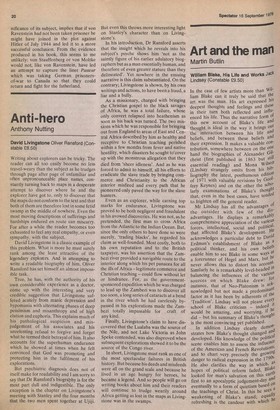Anti-hero
Anthony Nutting
David Livingstone Oliver Ransford (Constable £8.50) Writing about explorers can be tricky. The reader can all too easily become no less travel-weary than the subject as he trudges through page after page of unfamiliar and often unpronounceable place names, constantly turning back to maps in a desperate attempt to discover where he and the explorer have got to, only to discover that the maps do not conform to the text and that both of them are therefore lost in some fetid swamp in the middle of nowhere. Even the most moving descriptions of sufferings and hardships endured en route can miscarry. For after a while the reader becomes too exhausted to feel any real empathy, or even sympathy, with the subject.
David Livingstone is a classic example of this problem. What is more he must surely rank among the least attractive of the legendary explorers. And in attempting to write a readable biography of him, Oliver Ransford has set himself an almost impossible task.
True, he has, with the authority of his own considerable experience as a doctor, come up with the interesting and very credible suggestion that Livingstone suffered acutely from manic depression and hypomania with alternating phases of deep pessimism and misanthropy and of high elation and euphoria. This explains much of his pathological suspicion and misjudgetnent of his associates and his unrelenting refusal to forgive and forget what he termed their betrayal of him. It also accounts for the superhuman endurance which he showed at times when he felt convinced that God was promoting and protecting him in the fulfilment of his explorations.
But psychiatric diagnosis does not of itself make for readability and I am sorry to say that Dr Ransford's biography is for the most part dull and indigestible. The only exception is the chapter on Livingstone's meeting with Stanley and the four months that the two men spent together at Ujiji. But even this throws more interesting light on Stanley's character than on Livingstone's.
In his introduction, Dr Ransford asserts that the insight which he reveals into his subject's psyche shows him 'not as the saintly figure of his earlier adulatory biographers but as a man essentially human, and therefore of even greater stature than they delineated'. Yet nowhere in the ensuing narrative is this claim substantiated. On the contrary; Livingstone is shown, by his own writings and actions, to have been a fraud, a liar and a bully.
As a missionary, charged with bringing the Christian gospel to the black savages of Africa, he was a total failure, whose only convert relapsed into heathenism as soon as his back was turned. The two missions which he was responsible for bringing out from England to areas of East and Central Africa described by him as healthy and receptive to Christian teaching perished within a few months from fever and native hostility, which disasters he sought to*cover up with the monstrous allegation that they died from 'sheer idleness'. And as he was forced to admit to himself, all his efforts to eradicate the slave trade by bringing commerce and Christianity to the African interior misfired and every path that he pioneered only paved the way for the slave hunters.
Even as an explorer, while earning top marks for endurance, Livingstone was proved to be both negligent and fraudulent in his avowed discoveries. He was not, as he pretended, the first man to cross Africa from the Atlantic to the Indian Ocean. But, since the only others to have done so were merely, 'trading blacks', he regarded his claim as well-founded. Most costly, both to his own reputation and to the British taxpayer, was his assertion that the Zambezi river provided a navigable route to the interior along which his pet panacea for all the ills of Africa — legitimate commerce and Christian teaching — could flow without let or hindrance. For, as the governmentsponsored expedition which he was charged to lead up the Zambezi was to discover all too soon, a long series of cataracts at a bend in the river which he had carelessly bypassed in his explorations made the Zambezi totally impassable for craft of any kind.
Finally, Livingstone's claim to have discovered that the Lualaba was the source of the Nile, and not Lake Victoria as John Speke contended, was also disproved when subsequent explorations showed it to be the source of the Congo river.
In short, Livingstone must rank as one of the most spectacular failures in British history. But because his deeds and misdeeds were all on the grand scale and because he lived in an age hungry for heroes, he became a legend. And so people will go on writing books about him and their readers will continue to trudge wearily around Africa getting as lost in the maps as Livingstone was in the swamps.


































 Previous page
Previous page